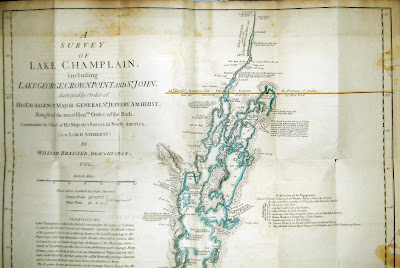 And the British who came had to find their way around the wilderness that covered most of the Americas. To do this they needed maps. To fill this need Robert Sayer and John Bennet had a set of maps printed and bound together in a small atlas.
And the British who came had to find their way around the wilderness that covered most of the Americas. To do this they needed maps. To fill this need Robert Sayer and John Bennet had a set of maps printed and bound together in a small atlas.It was officially The American Military Pocket Atlas, but known as the “Holster Atlas” because it was more commonly carried in an officer’s holster. Rauner’s edition is in the original marbled boards and shows wear consistent with use. This 8.75 x 5.5 inch book was printed in London for Sayer and Bennet in 1776, and contained the “maps that the British high command regarded as providing the essential topographical information in the most convenient form.” It was intended for use by British army officers in the field. An advertisement bound into the atlas states, that it was “calculated in its Bulk and Price to suit the Pockets of Officers of all Ranks.”
 The idea for the atlas was suggested by Governor Pownell, then a Member of the British Parliament, but formerly the Governor of the Massachusetts Colony from 1757-1760 and later commissary-general of the British troops in Germany. Initially opposed to the War with America he became a supporter of Lord North after the outbreak of hostilities.
The idea for the atlas was suggested by Governor Pownell, then a Member of the British Parliament, but formerly the Governor of the Massachusetts Colony from 1757-1760 and later commissary-general of the British troops in Germany. Initially opposed to the War with America he became a supporter of Lord North after the outbreak of hostilities.The atlas claims to contain “Surveys and Topographical Charts being fit only for a Library” and, indeed, most of the maps were issued as separate items previous to their publication in this smaller format.
There are a total of six maps: North America, As Divided Amongst the European Powers, by Samuel Dunn; A Complete Map of the West Indies, Containing the Coast of Florida, Louisiana, New Spain and Terra Firma: With All the Islands, also by Dunn; A General Map of the Northern British Colonies in America by Sayer and Bennet; A General Map of the Middle British Colonies, in America by Sayer and Bennet (based on work by Lewis Evans); A General Map of the Southern British Colonies, in America, by Sayer and Bennet (based on a map by Bernard Romans); and A Survey of Lake Champlain, by Sayer and Bennet (based on a survey by William Furness Brassier).
Ask for McGregor 5 to use this atlas or view it online.

No comments :
Post a Comment